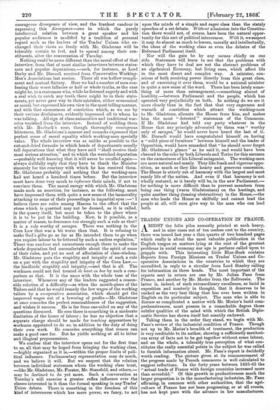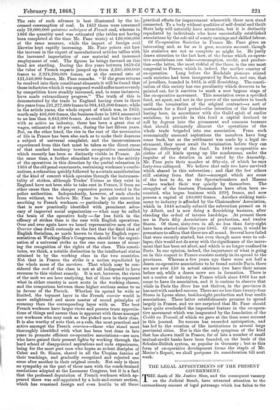TRADES' UNIONS AND CO-OPERATION IN FRANCE.
it_MIDST the folio piles annually printed at such heavy, and in nine cases out of ten useless cost to the country, there was issued last year a thin quarto of two hundred pages which really is about the most valuable publication in the English tongue on matters lying at the root of the greatest problems in social economy our age is perforce called upon to grapple with. This interesting little Blue-Book contains Reports from Foreign Missions on Trades' Unions and Co- operative Associations in the countries to which they are accredited, in reply to a circular from Lord Stanley calling for information on these heads. The most important of the reports sent in return are one by Mr. Julian Fane from France, and another by Mr. Morier from the Zollverein. The latter is, indeed, of such extraordinary excellence, so lucid in exposition and masterly in thought, that it deserves to be ranked as the very best thing that has ever been written in English on its particular subject. The man who is able to discuss so complicated a matter with Mr. Morier's lucid com- prehensiveness, must possess in a remarkable degree those subtler qualities of the mind with which the British Diplo- matic Service has shown itself bat scantily endowed.
Taking them in the order they stand, we begin with Mr. Fane's review of the industrial condition of France. Though not up to Mr. Morier's breadth of treatment, the production is very creditable to its author, showing a sufficiently meritori- ous array of facts not to be got together without some labour, and on the whole, a tolerably true perception of what con- stitutes the really essential points in the subject he was called to furnish information about. Mr. Fane's report is decidedly worth reading. The picture given at its commencement of the progress made by French commerce is well calculated to suggest reflections. In the forty years between 1825-65 the "actual trade of France with foreign countries increased more than sevenfold." Of this growth in productiveness much the larger proportion is in the manufacturing industries, Mr. Pane affirming, in common with other authorities, that the agri- culture of France has not been progressing, or at all events, has not kept pace with the advance in her manufactures. The rate of such advance is best illustrated by the in- creased consumption of coal. In 1857 there were consumed only 79,000,000 quintaux me'triques of French coal, whereas in 1866 the quantity used was estimated (the tables not having been completed at the time Mr. Pane wrote) at 120,000,000 of the same measure, while the import of foreign coal likewise kept rapidly increasing. Mr. Fane points out how the increase in the export of manufactured articles tallies with the increased importation of raw material and increased employment of coal. The figures he brings forward on this head are startling. During the five years between 1859-64 the value of French experts jumped up from 2,266,400,000 francs to 2,924,200,000 francs, or at the annual rate of 131,540,000 francs, Mr. Pane remarks. "If the gross returns be resolved into their constituent elements it will be found that those industries which it was supposed would suffermost severely by competition have steadily increased, and, in some instances, have made extraordinary progress." The truth of this is demonstrated by the trade to England having risen in these five years from 591,277,000 francs to 904,441,000 francs; while in the article yarns, the whole export of which was, in 1859, worth only 406,000 francs, the business done in 1864 amounted to no less than 8,842,000 francs. As could not but be the case with so active an industry, there has been a great rise of wages, estimated at 40 per cent., during the last fifteen years. But, on the other hand, the rise in the cost of the necessaries of life in France has been also such as to make their dearness a subject of universal complaint, and the inconveniences experienced from this fact must be taken as the direct cause of that marked tendency towards co-operative associations which recently has been so distinctly visible in France. At the same time, a further stimulant was given to the activity of the operatives in this direction by the partial relaxation in 1864 of the old penal enactments, restraining workmen's combi- nations, a relaxation quickly followed by a certain manifestation of the kind of concert which operates through the instrumen- tality of strikes, although Trades' Unions as they exist in England have not been able to take root in France, if from no other cause than the sharper repressive powers vested in the police authorities. Independently, however, of such checks from without, we believe Mr. Fane to be quite correct in ascribing to French workmen — particularly to the section that is now practically identified with prominent advo- cacy of improved social organization — what may be called the brain of the operative body — far less faith in the efficacy of strikes than is the case with English operatives. Over and over again have we heard representative men of the Ouvrier class dwell curiously on the fact that the fixed idea of English Socialism, as made known to them by English repre- sentatives at Working-Men's Congresses, should be the organi- zation of a universal strike as the one sure means of secur- ing the recognition of the rights of the class. This consti- tutes, we think, a notable distinction in the intellectual status attained to by the working class in the two countries. Not that in France the strike is a notion repudiated by the whole mass of the ouvriers. That which may be con- sidered the mob of the class is not at all indisposed to have recourse to this violent remedy. It is not, however, the views of the mob we are here analyzing, but of those who represent what in either country is most acute in the working classes, and the comparison between these higher sections seems to us in favour of the French. Whether its spread be wide or limited, the topmost layer in the French ouvrier world is more enlightened and more master of sound principles of economy than the corresponding layer with us. The best French workmen have larger views and possess truer apprecia-. tions of things and means than is apparent with those amongst our workmen who may rank as the picked men in their class. It is also worthy of note that, as a rule, the most practical and active amongst the French ouvriers—those who stand most thoroughly identified with what has been best done in late years to promote efficient co-operative associations—are men who have gained their present lights by working through the hard school of disappointed aspirations and rude experiences, being for the most part men who began as ardent disciples of Cabot and St. Simon, shared in all the Utopian fancies of their teachings, and gradually recognized and rejected one error after another in their original creeds. Not only is there no sympathy on the part of these men with the crack-brained resolutions adopted at the Lausanne Congress, but it is a fact that the professed deputation of French workmen which ap- peared there was self-appointed by a hole-and-corner section, which has remained foreign and even hostile to all those
practical efforts for improvement wherewith these men stand connected. To a body without qualities of self-denial and thrift. State help will naturally have attraction, but it is distinctly repudiated by individuals who have successfully established associations by the sole aid of scanty earnings and skilled labour.
Of Co-operative Societies in France Mr. Fane gives an interesting and, as far as it goes, accurate account, though his statistics are not as complete as might be. He justly draws attention to the fact how, of the forms which co-opera- tive associations can take—consumption, credit, and produc- tion—the latter, the most riskful of the three, is the one most congenial to France, which is, indeed, the mother country of co-operation. Long before the Rochdale pioneers stirred such societies had been inaugurated by Buchez, and one, that of jewellers, founded in 1834, is still flourishing. The consti- tution of this society has one peculiarity which deserves to be pointed out, for it survives to mark a now bygone stage of • the co-operative movement. This association owns a specified fund, set apart, and not in the power of the members to touch until the termination of the original contract—a sort of mortmain for a fixed period—the intention of the founders having been, in accordance with the Guild spirit of earlier socialism, to provide in this fund a capital destined to roll by degrees into the permanent and common treasure that should ultimately aliment the operations of the whole trade brigaded into one association. From such economically unsound aspirations the members have long
come back, but as the settlement was made by a legal in- strument, they must await its termination before they can dispose differently of the fund. In 1848 co-operative so- cieties of all kinds sprang up like mushrooms, under the impulse of the dotation in aid voted by the Assembly. Mr. Fans puts their number at fifty-six, of which he says forty-two collapsed. We believe that only two have survived which shared in this subvention ; and that the few others still existing from that date—amongst which are some of the best to do, as the Spectaclemakers and Masons —have worked their way quietly by themselves. The struggles of the fourteen Pianomakers have often been re- counted, who began business with 229k francs, and now possess a capital of 180,000 francs. Another striking testi- mony to industry is afforded by the Chairmakers' Association, which in 1848 actually refused the subvention pressed on it by Albert, and is now doing a flourishing business, after standing the ordeal of intense hardships. At present there are in Paris fifty Associations of production, and twelve Stores. Of these, sixty-two in all, no less than forty-eight have been started since the year 1865. Of course, it would be premature to affirm that these are all sound. Several have failed that were recently started, but even though more were to col- lapse, this would not do away with the significance of the move- ment that has been set afoot, and which is no longer confined to- Paris. In our opinion, indeed, the importance of what is going on in this respect in France consists mainly in its spread to the provinces. Whereas a few years ago there were not half a dozen co-operative associations to be found outside Paris, there are now over 150 in actual existence (we have their names before us), while a dozen more are in formation. There is not a centre of industry in France which since 1866 has not come to have its association, and it is curious to observe that while in Paris the Store has not thriven, in the provinces it has met with marked success. There are no less than twenty-four Stores in Lyons alone, besides eight production and four credit associations. These latter establishments promise to spread largely in France, and we are surprised that Mr. Fane should have quite overlooked the important feature in the co-opera- tive movement which was inagwated by the foundation of the Credit au Travail, of which we gave at the time some account in this journal. Its success has exceeded anticipation, and has led to the creation of like institutions in several large provincial cities. Nor is this the only symptom of the kind that has shown itself in France, for of late a number of small mutual-credit banks have been founded, on the basis of the Schulze-Delitsh system, so popular in Germany ; but as this form of co-operative development forms the staple of Mr. Morier's Report, we shall postpone its consideration till next week.



































 Previous page
Previous page